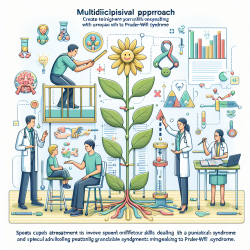Prader-Willi Syndrome (PWS) is a complex neuroendocrine disorder requiring comprehensive and coordinated care. The recent research article "A multidisciplinary approach to the clinical management of Prader–Willi syndrome" by Duis et al. (2019) underscores the value of a multidisciplinary clinic model in improving outcomes for individuals with PWS.
As a practitioner, incorporating the findings from this research into your clinical practice can enhance patient care and outcomes. Here are key takeaways from the study:
Benefits of a Multidisciplinary Approach
- Comprehensive Care: Multidisciplinary clinics provide a holistic approach to patient care, addressing the various facets of PWS including medical, nutritional, behavioral, and psychosocial aspects.
- Improved Communication: Regular interaction among specialists fosters better communication and coordination, ensuring that all aspects of a patient's care are considered and managed effectively.
- Family-Centered Care: This approach places a significant emphasis on family involvement, which is crucial for managing PWS, especially in pediatric cases.
- Access to Resources: Multidisciplinary clinics often serve as Centers of Excellence, providing access to the latest research, clinical trials, and advanced therapies.
Implementation Strategies for Practitioners
Practitioners can adopt several strategies to align with the multidisciplinary model recommended by Duis et al. (2019):
- Collaborate with Specialists: Establish connections with endocrinologists, geneticists, nutritionists, behavioral therapists, and other relevant specialists to create a comprehensive care team.
- Utilize Telemedicine: Incorporate telemedicine to reach patients in rural or underserved areas, ensuring they receive the same level of care as those in urban centers.
- Engage in Continuous Education: Stay updated with the latest research and clinical guidelines for PWS management. Participating in workshops and conferences can provide valuable insights and networking opportunities.
- Involve Families: Actively involve families in the care process, providing them with the necessary education and resources to manage PWS effectively at home.
Encouraging Further Research
The article by Duis et al. (2019) also highlights the gaps in current knowledge and the need for ongoing research. Practitioners are encouraged to contribute to this body of knowledge by:
- Participating in Clinical Trials: Engage in or refer patients to clinical trials that explore new treatments and management strategies for PWS.
- Collaborating on Research Projects: Work with academic and research institutions to investigate new approaches to PWS care.
- Publishing Case Studies: Share your clinical experiences and outcomes through publications to contribute to the collective understanding of PWS management.
To read the original research paper, please follow this link: A multidisciplinary approach to the clinical management of Prader–Willi syndrome.










